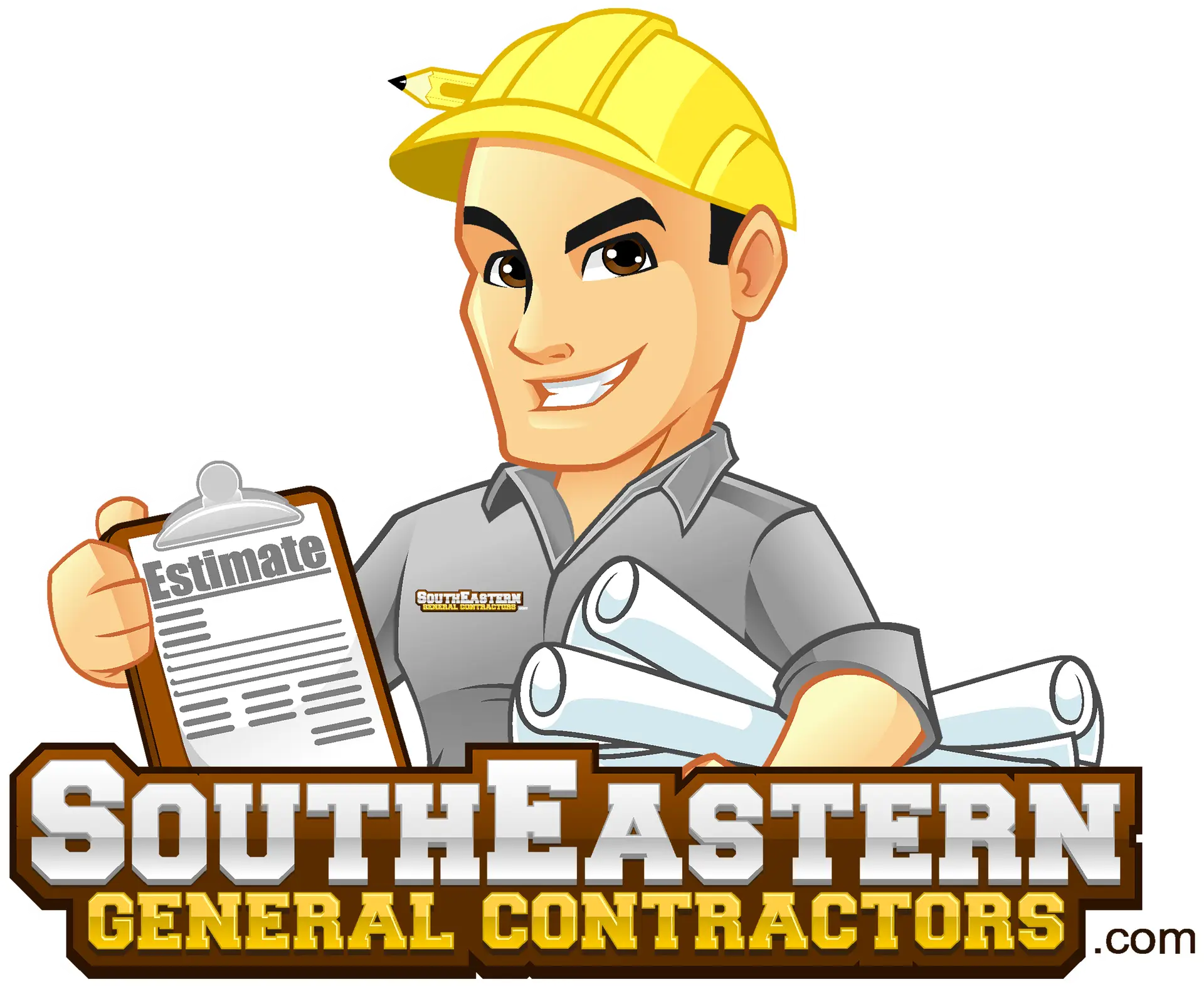
Trustworthy New Home Builders NC | Find Your Perfect Builder
Finding the right new home builders in NC is an exciting first step, but let's be honest—it can also feel overwhelming. Where do you even begin? The secret is to do your homework before you start contacting builders. Getting a handle on the market and what you truly need in a home lays the groundwork for a great partnership. It's about finding a team that's as invested in building your legacy as you are, not just constructing a house.
How to Start Your North Carolina Home Builder Search
The North Carolina housing market is booming, and that's both a blessing and a curse. There's a ton of opportunity, but it also means there are a lot of builders to sort through. Before you get lost in a sea of beautiful portfolio pictures, it’s smart to ground your search in reality. Figure out what the market looks like and, more importantly, what you absolutely need in your new home. This prep work saves you from headaches down the road and lets you walk into conversations with builders feeling confident and prepared.
The growth here is pretty incredible. North Carolina is one of the top states in the country for new home construction, with an estimated 94,000 new housing units added in 2024 alone. That puts us fourth in the nation for housing growth. This means you've got a competitive market full of builders, especially in hot spots like Wake and Mecklenburg counties. You can dig into more data on these housing trends to see how it might affect your search.
Pinpoint Your Vision and Your "Must-Haves"
Okay, time for the first practical step. Grab a notebook or open a new document and start making a list. But this isn't just about bedrooms and bathrooms; it's about how you live. What are your non-negotiables?
Think through things like:
- Your Daily Life: Do you work from home and need a dedicated office? Is a first-floor primary suite a must-have for long-term comfort? Are you the family host who needs a big, open kitchen for gatherings?
- Location, Location, Location: Is being in a top-rated school district the most important thing? Or maybe a shorter commute to Fayetteville is the priority? Perhaps you're dreaming of a quieter, more rural spot near Lumberton.
- What's Next: Do you see your family growing in the next few years? Do you have hobbies that need dedicated space, or should you plan for future accessibility needs?
This isn't just a simple checklist. It's the blueprint for your future home. Getting this clear in your own mind is the single most important thing you can do at this stage.
After more than 21+ years in this business, we at SEGC have seen it time and again: the best projects begin with a client who knows what they want. When you have a firm grasp on your must-haves, it allows a builder to apply their expertise to create a home that truly works for you and your family for decades to come.
Before you start reaching out to builders, it's helpful to organize your initial research. This checklist will guide you through defining the scope of your project so you can have productive first conversations.
Initial Home Builder Research Checklist
| Research Step | Key Action | Why It Matters |
|---|---|---|
| Define Your "Why" | List your top 3-5 reasons for building a new custom home. | This keeps you focused on your core motivations throughout the process. |
| Establish Location Priorities | Identify specific towns, counties, or school districts. | Narrows your search to builders who work in your desired area. |
| Create a "Needs vs. Wants" List | Separate non-negotiable features from "nice-to-have" items. | Helps you evaluate floor plans and communicate priorities clearly. |
| Set a Realistic Budget Range | Research land costs, construction costs per sq. ft., and financing options. | Provides a financial framework for your project and builder discussions. |
| Gather Inspiration | Save photos, floor plans, and design ideas that you love. | A visual guide helps builders understand your aesthetic and functional goals. |
Completing this checklist gives you a solid foundation. You'll be able to approach builders not just with a dream, but with a well-thought-out plan.
Get a Feel for the Timeline
Building a custom home is a marathon, not a sprint. It’s a significant journey with many moving parts, and understanding the general timeframe from the get-go helps set realistic expectations.
This visual guide breaks down the typical phases of a new home build in North Carolina.
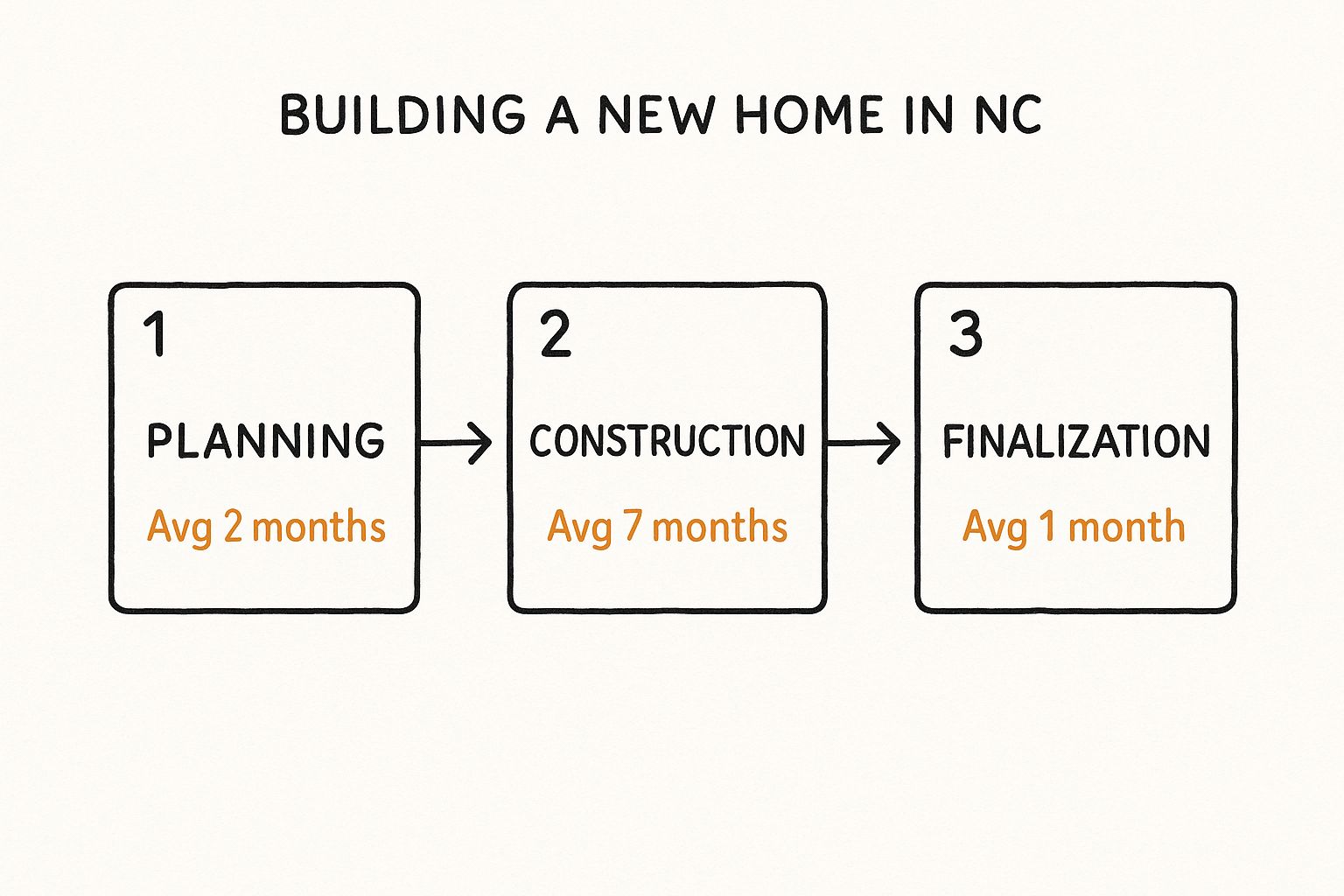
As you can see, while the actual construction is the longest phase, the upfront planning and the final wrap-up are just as vital to a smooth experience.
Now that you have your vision, a realistic budget, and a clear understanding of the process, you're finally ready for the exciting part: finding the right building partner to bring it all to life.
Vetting a Builder's Credentials and Reputation
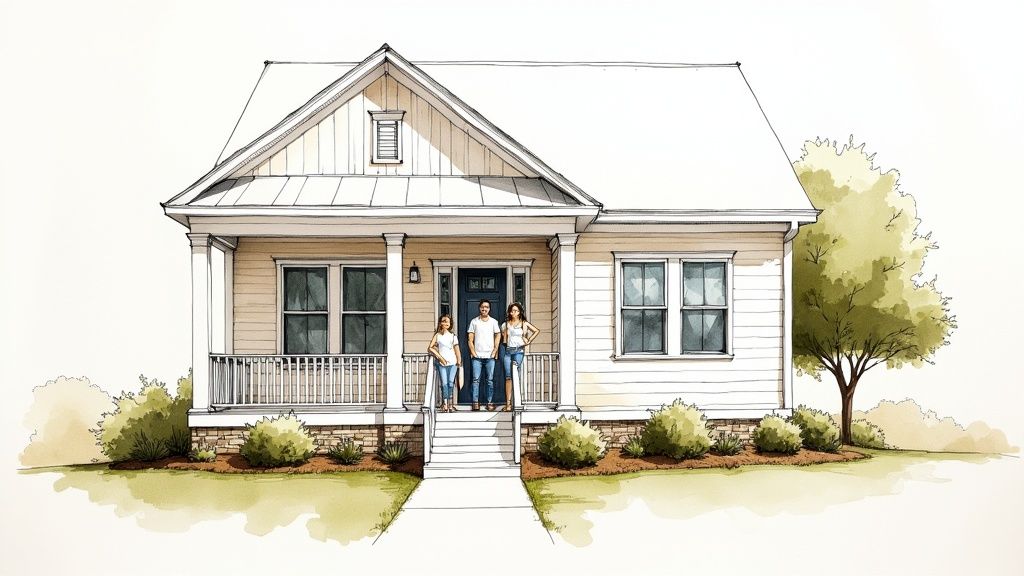
So, you've got a short list of potential builders. This is where the real work begins. It’s time to move past the glossy photos and slick websites and dig into what really matters: their credentials and reputation.
Honestly, anyone can make a house look good online. But verified credentials and a solid reputation in the community? That's what separates a true professional from someone who just knows how to market themselves. This is the step that protects your investment and ensures you find a partner who can actually bring your vision to life.
Your first move should be a visit to the North Carolina Licensing Board for General Contractors website. Every builder operating legally in the state must be licensed. But don't just check the box and move on. Look closely for any past complaints or disciplinary actions. This is your non-negotiable baseline for accountability.
Looking Beyond the License
A license is just the ticket to the game; it's the bare minimum. What you really want to see are certifications that tell a much deeper story about a builder's commitment to their craft.
For instance, here at SEGC, our status as a Native American-owned, SBA 8(a), and HUBZone certified firm isn’t just a collection of logos. These credentials come from a rigorous vetting process by government agencies. They’re proof of our financial stability and a track record of excellence that demanding clients rely on. When you see certifications like these, you know a builder has met standards far beyond what the state requires.
A builder's reputation is built one project at a time. It’s earned through years of keeping promises, communicating honestly, and standing behind their work long after the keys are handed over. This is the foundation of trust.
Digging into Community Reputation
Online reviews can be a good starting point, but they rarely paint the whole picture. To truly understand who you’re about to hire, you need to go old-school and see what the local community thinks.
Here’s how you can get a more accurate feel for a builder’s reputation:
- Check the Better Business Bureau (BBB): Look up their rating, sure, but more importantly, read any complaints. How did the builder respond? A thoughtful, professional response to a problem is often more telling than a perfect, complaint-free record.
- Talk to Local Suppliers: This is one of our favorite insider tips. Building material suppliers in towns like Fayetteville or Lumberton know exactly who pays their bills on time and who is a logistical nightmare. A polite phone call can reveal volumes about a builder’s financial health and organizational skills.
- Drive by Past Projects: Don’t just visit active job sites. Ask for addresses of homes they finished a few years ago. Take a drive and see how their work is holding up. Does the home still have that "wow" factor, or are there signs of premature wear?
A builder with deep roots and a good name in their community is always a safer bet. They have more to lose. Their reputation is on the line with every single home they build. Exploring a builder's history is a crucial part of learning how to find a good contractor.
After more than 21+ years of proven results, we know that a builder's character is just as critical as their craftsmanship. You're not just hiring someone to hammer nails; you're entrusting a partner with one of the biggest investments of your life. Take your time, do the homework, and choose a builder whose reputation lets you sleep at night.
Aligning on Process and Communication
A beautiful design and a rock-solid contract are fantastic starting points, but they don't capture what it's really like to build a house day in and day out. That experience comes down to two things: the builder's process and their commitment to communication.
Frankly, any builder can put up walls. The best new home builders in NC manage a highly complex project and make you feel like an informed, respected partner throughout. This is where a builder's character truly shines. It’s the difference between a stressful, confusing ordeal and an exciting, collaborative journey. We’ve seen it time and again building homes in places like Fayetteville and Lumberton—a clear communication plan is the foundation of a successful build.
What a Strong Communication Plan Looks Like
A vague promise to "keep you in the loop" just doesn't cut it. A real communication plan is proactive and structured, so you're never left guessing about the status of your single largest investment.
A great builder should be able to clearly define their communication strategy. Look for things like:
- A Designated Point of Contact: You need one person—a project manager, a site supervisor—who is your go-to. You should have their number and feel confident that when you call, you’ll get answers.
- Scheduled Check-ins: This isn't about random calls when something goes wrong. It's about pre-scheduled meetings, whether that's a weekly site walk-through, a bi-weekly summary email, or a quick phone call every Friday afternoon.
- A System for Documentation: How are your choices, change orders, and approvals being tracked? A professional builder will use a client portal, a shared digital folder, or at the very least, a clear email chain to create a paper trail.
Our Take: We've found that simple tools can make a huge difference. For instance, taking a quick video during a walkthrough to confirm a decision ensures everyone is literally on the same page. It completely eliminates the "he said, she said" confusion that can so easily derail a project's timeline and budget.
Understanding the Key Phases of Construction
Getting a handle on the basic construction sequence empowers you to ask smarter questions and know exactly where your project stands. While every custom home has its own unique quirks, the journey from a dirt lot to a finished home follows a fairly predictable path.
You'll definitely want to go over the proposed timeline with your builder. But the more important question is how they manage the transitions between phases. This is where delays often sneak in. An organized, experienced builder has solid, long-standing relationships with their subcontractors, which makes the handoff from foundation to framing, or from drywall to painting, much smoother.
For a more detailed list of questions to bring to this conversation, check out our guide on how they manage project schedules and subcontractors.
This isn't just about good customer service. A builder's dedication to process and communication is a direct reflection of their professionalism and their respect for you. After more than 21+ years of proven results, we know that choosing a partner who guides you with clarity and integrity is the most important decision you'll make on this journey.
Making Sense of Builder Quotes and Contracts
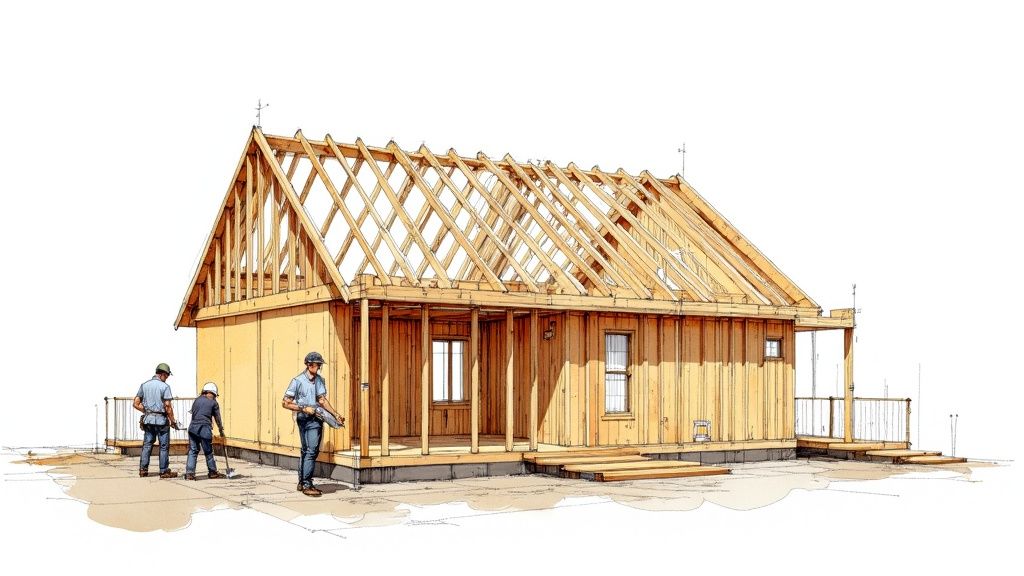
You’ve done the hard work of narrowing down your list of builders, and now the bids are rolling in. It’s so tempting to just scan for the lowest number, but I can tell you from experience, the cheapest quote is almost never the best value. To feel truly confident in your choice, you need to look beyond the price tag and understand exactly what you’re paying for.
This part of the process is all about digging into the details. A great builder, especially one who has built a reputation in communities like Fayetteville and Lumberton, will provide a quote that’s a clear roadmap, not a puzzle. The contract should feel like a partnership agreement, designed to protect both you and them.
What a Good Quote Really Looks Like
Think of a builder's quote as more than just a price—it's a window into their process and professionalism. A single page with one big number at the bottom? That's a huge red flag. A thorough, trustworthy quote breaks everything down so you can see precisely where every dollar is going.
Here’s what you should be looking for:
- Specific Material Lists: The quote needs to name names. What brand of windows are they using? What type of shingles and siding? "Builder-grade" is a meaningless term that can be used to justify lower-quality products.
- Realistic Allowances: Allowances are placeholders in the budget for things you’ll pick out later, like light fixtures, countertops, or flooring. A common trick is to plug in lowball allowance numbers to make the total bid look more attractive. Make sure these amounts are realistic for the quality you're expecting.
- A Clear Scope of Work: The document must spell out exactly what work the builder is doing. Just as important, it should also list what isn't included. Things like final landscaping, utility hookup fees, or major site work can be expensive surprises if they aren't accounted for.
At SEGC, we’ve learned over our 21+ years of proven results that trust starts with transparency. A detailed quote prevents frustrating surprises down the road. It ensures the home we build is the one you dreamed of, without hidden costs or last-minute compromises.
Fixed-Price vs. Cost-Plus: Which Contract is Right for You?
When you get to the contract stage, you’ll likely see one of two main structures. Understanding the difference is key to managing your budget and feeling comfortable with the financial side of the project.
| Contract Type | How It Works | The Upside | The Downside |
|---|---|---|---|
| Fixed-Price | You agree to one set price for the entire project. | Offers predictability and makes budgeting straightforward. | Any changes you request (change orders) will cost extra. The builder has already factored their profit and a contingency for problems into the price. |
| Cost-Plus | You pay the actual cost of all labor and materials, plus a set fee or percentage for the builder's profit and overhead. | You get total transparency and see every invoice. | The final price isn't guaranteed. You share the financial risk if material costs jump or unexpected issues pop up. |
The market for new home builders in NC is moving quickly, and it's essential to understand all the factors that influence your final investment.
Contract Red Flags You Can't Afford to Ignore
Your contract is your most important legal protection—period. Read every single word, and don't feel rushed. A good builder will give you plenty of time to review it, and it's always a smart move to have a real estate attorney take a look.
Keep a sharp eye out for these potential issues:
- Fuzzy Payment Schedules: Payments should always be tied to clear, completed stages of construction—like "foundation poured" or "framing complete"—not just random dates on a calendar.
- Vague Timelines: The contract needs a projected start date and a completion date. It should also explain how potential delays (like weather) are handled.
- Missing Lien Waivers: This is absolutely critical. A lien waiver clause protects you by ensuring that once you pay your builder, their subcontractors and suppliers can't put a lien on your new home.
A contract isn't just a legal document; it's a reflection of the builder's commitment to quality and client trust.
Making the Final Choice and Building Your Legacy
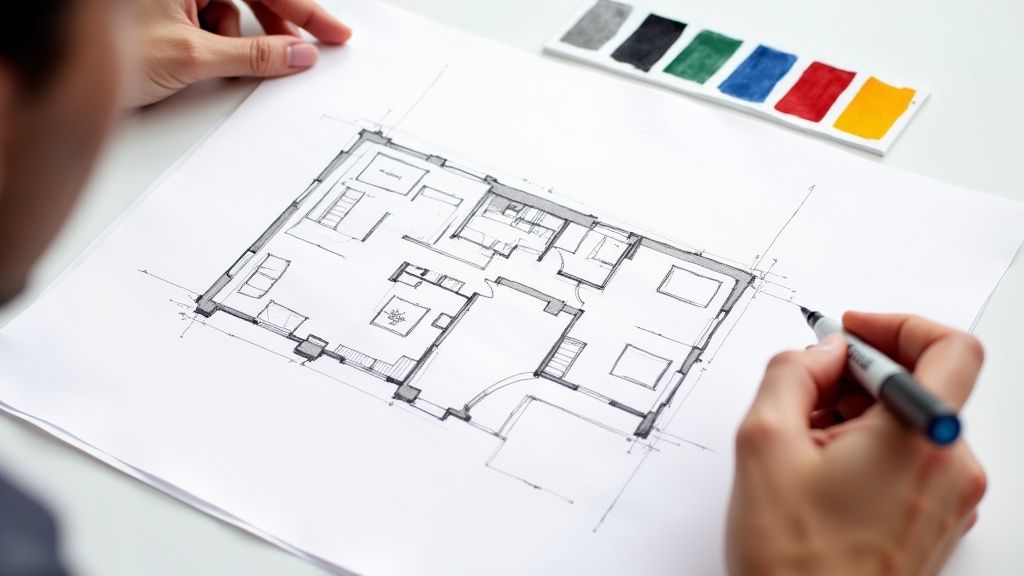
You’ve done the research. You've vetted the candidates and crunched the numbers. Now, the final decision moves beyond the spreadsheets. It becomes about finding a true partner—someone who doesn't just understand your blueprint but also gets your vision for the future.
This is the moment where you stop planning a house and start building a legacy. Choosing from the top new home builders in NC is about picking the team you can trust to bring your dream to life with genuine integrity and craftsmanship.
See the Work and Talk to Past Clients
A builder's portfolio is their resume, but you need to go beyond the glossy photos. Ask to walk through a recently completed home. Even better, see if you can visit a home they built a few years ago. This is how you get a real feel for their work and see how it holds up over time.
Then, you need to talk to their past clients. This is non-negotiable. A confident builder with nothing to hide will gladly provide you with one or two references. This is your opportunity to get the unfiltered story.
Insightful Questions to Ask Previous Clients:
- How did the builder handle surprises or changes during construction?
- Did the final cost match the initial budget? If not, were the extra costs clearly explained and approved by you?
- What was communication like after you moved in? Were they responsive when you needed them for punch-list items?
- Knowing everything you know now, would you hire them again?
The answers here will tell you more about a builder’s character than any slick brochure ever could.
A Legacy Built on Trust in Lumberton
At SEGC, we’ve always believed we're building legacies, not just structures. We once had the privilege of working with a family in Lumberton who were finally building their "forever home." They'd saved for years and, understandably, came to us with a lot of anxiety, full of horror stories they'd heard about projects spiraling over budget and past deadlines.
Our project manager made them a simple promise: every single Friday, he would send a quick video walkthrough showing the week’s progress and an updated budget snapshot. It wasn't a complicated system, but it was honest and consistent. That simple, weekly check-in built an incredible amount of trust. We finished their home on schedule, and years later, they still mention that the peace of mind they had during the build was just as valuable as the beautiful home they live in today.
The Right Partner in a Demanding Market
Picking the right builder is more critical than ever, especially given the current housing market. With a for-sale housing availability rate of just 0.8%, the market is incredibly tight. This puts enormous pressure on builders. In this kind of environment, a builder’s ability to manage their resources, keep quality high, and communicate effectively is what separates the best from the rest.
Choosing a builder is the final, most important step. It's an investment in a relationship. Your builder should be a guide, an advocate, and a partner who honors the trust you place in them from the first handshake to well beyond the final walkthrough.
As a Native American-owned, 8(a), and HUBZone certified firm, our reputation in communities like Fayetteville and Lumberton is everything. Our 21+ years of proven results come from that foundation of client trust and an absolute refusal to compromise on quality. Choose a builder who sees your home not as a project number, but as the legacy it is.
Got Questions About Building a Home in NC? We’ve Got Answers.
Once you’ve narrowed down your list of potential builders, a whole new wave of questions usually starts to surface. That’s completely normal. You're moving from the research phase to the brink of one of the biggest projects of your life. It’s a major step!
We've been building homes across North Carolina for a long time, so we’ve heard just about every question in the book. Here are a few of the most common ones we get, along with some straight-shooting answers based on our hands-on experience.
How Long Does It Really Take to Build?
Let's be realistic. While every project is unique, building a custom home in North Carolina typically takes 7 to 12 months for the actual construction. That's from the day we break ground to the moment you walk through the finished home.
Keep in mind, this timeline doesn't include the pre-construction phase. The initial design work, getting all your selections finalized, and securing permits can easily add another 2 to 4 months on the front end.
Several things can shift that timeline:
- Your Property: Building on a sloped, rocky, or heavily wooded lot just takes more time and heavy machinery than starting with a flat, clear parcel.
- Complexity & Scale: A sprawling home with intricate architectural details will naturally have a longer build schedule than a more straightforward design.
- Material Lead Times: We work with a great network of suppliers, but certain high-end or custom-ordered materials can sometimes have longer waits.
- The Weather: Let’s face it, North Carolina weather has a mind of its own. Any experienced builder will have a plan and build some buffer days into the schedule to account for this.
Can I Visit My Home While It's Being Built?
Yes, and you absolutely should! A builder who is confident in their process and quality will not only allow but encourage you to see the progress.
At SEGC, we see it as your home from day one. We schedule regular site visits with your project manager. This is the best way to keep you in the loop, ensure everyone stays safe on-site, and answer any questions you have right then and there, looking at the work together.
A builder with an open-door policy is showing you they're proud of their craftsmanship and have nothing to hide. It's a huge indicator of transparency and a key part of how we’ve built trust in communities like Fayetteville and Lumberton for over 21+ years.
What Kind of Warranty Should I Expect from My Builder?
Any professional, reputable builder in North Carolina will back up their work with a written warranty. The standard in our industry is a one-year warranty that covers workmanship and materials.
What does that mean in practice? If a door starts sticking or you notice a paint defect within that first year, the builder is responsible for coming back to make it right.
On top of that, many of the products in your home—your HVAC system, appliances, roofing shingles—have their own separate manufacturer's warranties. A truly organized builder will give you a comprehensive package at closing with all of this documentation neatly compiled. It’s part of our philosophy: we're building legacies, not just houses, and we stand by our quality long after you have the keys.
At South Eastern General Contractors, we know that an informed client makes the best partner. Our goal is to give you the clarity and guidance you deserve, answering every question along the way.
Ready to build your legacy with a team you can trust? Contact us today to start the conversation.



